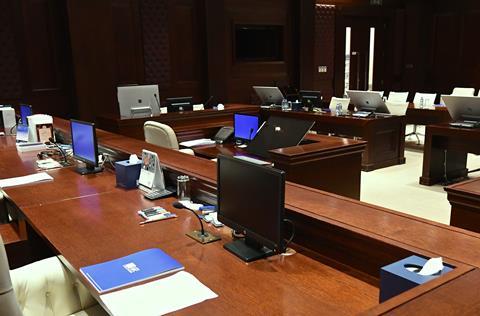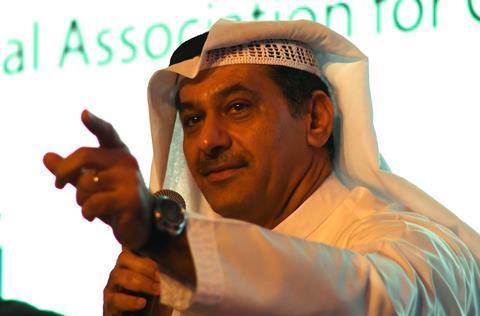As host of a high-rolling conference on court excellence and innovation, Dubai showcased performance standards that less lavishly endowed jurisdictions can learn from. Michael Cross reports
THE LOW DOWN
‘Hurrah for despotism!’ So wrote Herbert Baker to fellow architect Edwin Lutyens, reflecting on the heady scale of commission the riches of empire made possible. Litigators who approve of the five-star commercial disputes facilities built in Dubai might privately concur. With the backing of the ruling family, the courts of Dubai’s international financial centre have created service levels, technology and fit-for-purpose rules – all in 10 years flat. They need to be good, as competition to ‘host’ international disputes is keen. It is not just London shouting that it is ‘open for business’ – so are Abu Dhabi, Singapore and Paris. But the dialogue on ‘future courts’ is not just about courtroom bling. Lessons are being shared on the implications worldwide of online justice and procedural reform to save court systems hit by cuts and besieged by litigants in person.
The biggest surprise on visiting the Dubai International Finance Centre (DIFC) Courts is learning that it is a public institution. Certainly it does not resemble a conventional courthouse; the ambience is more that of a white-shoe law firm. The thickly panelled walls of the soundproof main courtroom, packed with the latest information technology, the bust of the first presiding judge in reception, cry (subtly, by Dubai standards): money.
‘We are a public service,’ replies Michael Byrne, senior communications officer, to a question about the courts’ fee structure – a tariff that looks very reasonable by England and Wales Commercial Court standards.
But the fact that the courts employ a marketing department tells a story. The DIFC, which is celebrating its 10th anniversary, helped create what is now an intensely competitive international market in common-law commercial dispute resolution. Just as newly independent states once raced to establish flag-carrying airlines, now new and not-so-new centres of economic activity see an English language court as an essential hallmark of credibility.
Now that common law commercial courts are springing up everywhere, from Astana to Xi’an – not to mention Paris – it is easy to forget that, a decade ago, the voluntary establishment of an alien jurisdiction was a complete novelty. ‘Imagine a court in the centre of London, where civil law judges rule in Norwegian on Norwegian law,’ Essam Al Tamimi, senior partner at leading Middle Eastern firm Al Tamimi & Co, suggests. His analogy is diplomatically weak: Nordic hegemony has not been a political issue in England and Wales for a millennium; the United Arab Emirates was a quasi-British colony until 1971. Cultural sensitivities run deep.
DIFC Courts, encompassing a court of first instance, court of appeal and a small tribunal court, was originally set up to encourage foreign investment by offering predictable and transparent resolution of disputes involving businesses registered in the tax-friendly Dubai International Finance Centre. In 2011 its scope widened significantly when a new law allowed parties anywhere in the world to opt in to its jurisdiction. In the first half of 2018, claims worth 2.1bn dirhams (£400m) were filed.
Many of its working practices are harbingers for less well-endowed courts. For example the ‘small claims’ threshold may be the highest in the world, taking in claims of up to 500,000 dirhams (£100,000), or twice that amount if the parties agree. Hearings – after a mandatory mediation session – can be conducted remotely by video conference with parties anywhere in the world.
‘The benefits are a confidential procedure and discreet process,’ says Nassir Al Nasser, Small Claims Tribunal judge and registrar. ‘Costs are low, lawyers are not required. So the only expense is court fees, which are low, and the claimant can receive these if successful. Matters are resolved in weeks rather than months or years.’
There is this wonderful doctrine of enforcement of foreign judgments as a right. That is not widely known in the civil law world
Michael Hwang, former chief justice of the DIFC Courts
Both the Small Claims Tribunal and the main courts are showcases for technology, including an e-bundles system from UK company CaseLines which is far more sophisticated than the so-called e-filing installed in London’s Rolls Building (see box, p18).
Of course technology is no use if a judgment is not going to be enforced. Dubai’s initial selling point was enforcement within the six Gulf Cooperation Council countries and, via a memorandum of understanding, with London’s commercial courts. ‘After that it became an easy sell to other courts,’ says Singaporean judge Michael Hwang, whose term as chief justice of the court ended this month. The court now has agreements with 11 jurisdictions. ‘We don’t need to sign any more, certainly with common law countries,’ says Hwang. In contrast with civil law jurisdictions, ‘there is this wonderful doctrine of enforcement of foreign judgments as a right. That is not widely known in the civil law world’.
The success of DIFC Courts has inspired worldwide imitation – though, as we shall see, perhaps the biggest threats to its market share are closer to home.
It is one thing for a court with the backing of a Gulf ruling family to set new standards of service and performance. But what lessons does it have for less lavishly endowed counterparts? This month’s anniversary events included hosting an international conference ‘court excellence and innovation’ under the auspices of benchmarking scheme the International Consortium for Court Excellence (ICCE). Attendees were predominantly from common law jurisdictions, and speakers found a remarkable amount of common ground in the challenge of dragging courts into 21st century ideas of performance and customer service.

WHEN TECHNOLOGY CLICKS
Technology is one of the four key building blocks of the DIFC Courts. Parties are required to file electronically and may appear from anywhere in the world – particularly appropriate for unrepresented claimants whose visas have expired.
The courts systems are a mixture of home-grown and off-the-shelf technology, running on a Microsoft cloud platform. The courts developed their own case-management system. ‘We wanted to minimise the number of clicks,’ says Arul Jose Vigin, senior manager, IT. This is seamlessly interfaced with ‘e-bundle’ software based on a system developed originally for the English Crown courts by UK specialist company CaseLines. It aims to create the look and feel of court bundles but on-screen. Its use will shortly be mandatory. Taylor Wessing is among the local firms to have installed the system for preparing its own bundles.
Future plans include blockchain, both to authenticate judgments for enforcement in other jurisdictions and to enable the court to rule on disputes involving ‘smart’ contracts.
An obvious point is that it is much easier to introduce innovations such as paperless working when you build from scratch. Daniel Hall, chair of the ICCE, noted that courts are ‘loosely coupled’ organisations, rather like hospitals, where the highest-status individuals are outside the chain of command.
‘Courts are traditional entities so terms like “performance management” do not go down well,’ said Sia Lagos, principal registrar of the Federal Court of Australia. She was describing the experience of reforming an institution created in the 1970s as the pre-eminent court on all federal matters but which gradually lost its focus. ‘The court had become a state-based court rather than a truly national court,’ she said, with inconsistencies depending on where a case was heard.
Innovations there include a docket system, with a specific judge managing a case from commencement to conclusion, hot-tubbing of expert witnesses and concise witness statements as well as better use of IT.
The adjustments were not painless, Lagos said. ‘Judicial independence was a huge thing that had to be specially discussed and delineated,’ she said, to reach an understanding that, while judicial independence was supreme on cases, courts management was another matter. ‘It took two years of one-to-one discussion with judges, led by the chief justice and we’re still a work in progress.’
Jennifer Marie, deputy presiding judge, State Courts of Singapore, also describes a reform process that will sound familiar to Britons. The focus is on online dispute resolution and help for growing numbers of litigants in person. A community justice centre run by court staff, lawyers and the local bar association offers instant 20-minute sessions of free legal guidance for litigants coming to court for the first time. The centre also links LiPs to social services to provide temporary interventions for families in need.
A self-help document assembly system helps unrepresented court users create documents online. Documents thus generated include an automatic mitigation plea, opening with the words: ‘Your honour, I plead guilty to these charges…’.
Ibrahim bin Huwayil, president of the Appellate Court of Riyadh, revealed that even the Kingdom of Saudi Arabia is reforming judicial processes with technology. More than 80% of civil defendants are notified of proceedings by text message, listing the number of the case, details of the court, as well as the date and time of hearing, bin Huwayil said.
However the chances of the UK courts emulating the system appear slim. It works in Saudi Arabia because mobile phone numbers are among the identity details required to be registered on the Unwan Al-Watani, a national address database. ‘We only had to make an electronic link between the Ministry of Justice and the national address system to allow us to contact defendants,’ bin Huwayil said, implying that data protection concerns were not an issue.
Representing the UK, futurologist professor Richard Susskind made a spirited defence of England and Wales’ own online courts programme. The future of civil justice lies in ‘asynchronous’ courts in which judges rule on evidence supplied digitally, he said: ‘Online is not an alternative to the courts system, it is the courts system. Within 10 years most cases will be resolved by online courts.’ He had one word of caution for the programme, saying that the proposed £25,000 claims value limit for the online court might be too high at first.
Other speakers reminded the event that reforms to improve the court experience do not necessarily involve technology or management jargon.
Judge Barney Thomas, of the District Court of New Zealand, revealed that all court sessions are now opened in Maori as well as English. In a similar vein, Judge Victoria Pratt, of Newark Municipal Court (New Jersey), spoke of a change in culture in dealing with defendants in an institution known locally as ‘the green monster’. Mostly this is a matter of treating court attendees politely. ‘Respect is contagious,’ she said. ‘If people perceive they are treated with respect, they comply with courts; if they see the justice system as fair they accept the court order even when it goes against them.’
Courts need to accept that they are in competition. We need to compete and have the same tools, if not better
Essam Al Tamimi, Al Tamimi & Co
Back in Dubai, the original five-star court entered a new era this year with the appointment of a new chief justice, Tun Zaki bin Azmi, former chief justice of Malaysia, and its first Emirati chief executive – Amna Al Owais, who steps into the very large shoes of her predecessor, English solicitor Mark Beer OBE. The new chief justice comes with a formidable reputation as a reformer who cleared a backlog of 6,000 cases in three years with a controversial ‘no adjournments’ rule. His predecessor Hwang introduced him with the highest possible compliment: ‘He behaves like a Singaporean in the way he runs his courts!’

Whether this will be enough to preserve and build Dubai’s reputation as an international jurisdiction of choice remains to be seen. Indiana University professor Jay Krishnan, author of a 10th anniversary history of the courts (which contains much more meat than the vanity publications conventionally published on these occasions), says that the DIFC Court has proven that a western-style common law system can be exported to a country such as the UAE. ‘However, constant vigilance is required to make sure that such courts run independently.’
Here, there is at least one cloud on the horizon. Despite its international culture, DIFC Courts is very much part of the Dubai courts system and conflicts of jurisdiction can arise – particularly when a litigant seeks to delay a case by bouncing it to the onshore courts and vice versa. Two years ago the government responded by setting up a Joint Judicial Committee to resolve conflicts of jurisdiction – and, to some eyes, cut the expanding reach of the DIFC Courts.
This conduit route for enforcement has been questioned and challenged by recent decisions of the newly established Joint Judicial Committee (JJC), which determines conflicts of jurisdiction between the onshore Dubai Courts and the DIFC Courts. At least one delegate at the conference warned that uncertainties created by the JJC could lead litigants to opt for the rival, the new Abu Dhabi Global Market Courts, just a 90-minute drive down the road.
Al Tamimi played down such fears, noting that a new arbitration law in Dubai resolves conflicts between DIFC Courts and domestic resolutions. ‘The authorities know they have created a problem, they are not in denial,’ he said. ‘They are drafting amendments to limit challenges [to the JJC] to a very narrow range of cases.’ While it is taking time, ‘the authorities are aware that it is needed’.
The real driver, Al Tamimi says, is competition. ‘The courts and law firms are finding their defects far too late. If the changes outside are greater than the changes inside, the end is near. You will become irrelevant. Courts need to accept that they are in competition. We need to compete and have the same tools, if not better.’
Of course the DIFC enclave’s survival – like that of its equivalents in China and central Asia – is hostage to a host government’s continued indulgence. In the case of Dubai, there is an inevitable question mark over its position in the UAE. In the decades since independence, numerous commentators, including this writer, have predicted a falling out in the key partnership between Abu Dhabi and Dubai. (It is significant that the UK’s supposedly cash-strapped diplomatic service maintains separate embassies in the two emirates.) Not only were those predictions wrong, but history now seems to be flowing in the opposite direction with a new Emirati nationalism emerging amid regional rivalries and the hideous war in Yemen.
As for Dubai itself, the desert may have disappeared under ranks of 70-storey skyscrapers, but, down at the creekside at dusk, wooden dhows still unload mixed cargoes of electrical appliances and domestic goods from across the Gulf and market traders still physically drag customers into spice shops or furtively offer ‘fake Rolex, very good’. The emirate’s position as the Gulf’s entrepôt seems as strong as ever: if a formidable dispute resolution forum is needed for that function, it will continue to be indulged.





























No comments yet